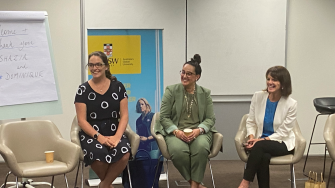Tackling unconscious bias through education and opportunity
How the AGSM Women in Leadership program equips a new generation of business leaders to better navigate unconscious bias – and other contemporary leadership challenges.
How the AGSM Women in Leadership program equips a new generation of business leaders to better navigate unconscious bias – and other contemporary leadership challenges.

Unconscious bias – the prejudices and assumptions we have that are outside our conscious awareness - is one of the biggest challenges facing female leaders today.
Research from the Australian Government’s Workplace Gender Equality Agency shows that women are underrepresented in leadership positions across Australia, even though they make up half of all employees.
While it isn’t an easy issue to tackle, it’s more important than ever to keep the conversation going – and that’s what the newly designed AGSM Women in Leadership program sets out to do.
As part of the Women in Leadership program, Rosamund Christie, Program Director, sat down with Dominique Powis, Chief Technology Officer at MedicalDirector (AGSM MBA 2009), and Shazia Ahmad, Head of Global Medical Governance, Excellence and Medical Information at Bayer Consumer Health, in a panel discussion at the AGSM Women in Leadership course in May to talk about this issue.
During this insightful and thought-provoking session, Dominique and Shazia shared their experiences of unconscious bias, the changes they’ve seen over their careers, and what other female leaders can do to shape a more inclusive and diverse culture in their own organisations.
Diversity in leadership: How unconscious bias has changed
Increasing numbers of companies are recognising the importance of having a diverse workforce, especially at the leadership level, with many investing in their female leaders through courses like AGSM’s Women in Leadership program.
When reflecting on how things have changed for the younger generation of women, both panellists agreed that unconscious bias is less of a problem now than it used to be, largely due to education, changes in societal attitudes and a readiness among women to speak up.
“When I was first starting my career, I experienced some pretty hefty sexual harassment and bullying. I still think some of that goes on, but people’s tolerance is a lot less. Women have had enough and that’s driving change,” said Dominique.
Change looks likely to continue in the future, but ongoing investment in women at all career stages is needed to ensure we don’t lose momentum.
“Many companies are setting public targets to keep them accountable. If we keep investing, especially in younger women starting out in their careers, we’ll definitely see more change,” said Shazia.
Unconscious bias is by its very definition something we’re not aware of, which makes it extremely challenging to overcome.
AGSM’s Women in Leadership (WIL) program works to tackle this by helping women change their mindset and build the confidence and practical negotiation skills to not only ask for what they want, but to influence others and drive change in their organisations and wider society.
“Women come to programs like WIL to learn from and share common challenges, tackle unconscious bias and to develop a sense of agency around influencing change,” Rosamund says.
“Women often wait to be encouraged to apply for roles. We help to develop personal agency during the program to expand our participants’ mindsets and skillsets. The outcome is a healthy sense of entitlement and a renewed energy to take the initiative in their own career promotions.”
A new generation of women eager to succeed
The panellists revealed that it’s not just societal attitudes that are changing - there’s been a more widespread shift in some of the mindsets that have typically held women back, such as lack of confidence or hesitation to put themselves forward for advanced roles. Women are now more ambitious, strategic and proactive in their careers than ever before.
“I’m seeing more women wanting to do more and do it sooner, and they’re not holding back,” Shazia said.
Dominique cited an increase in female role models as instrumental to inspiring young women to strive for more.
“I’m seeing women coming out of university and they’re hungry, but they’re also smart. They’re seeing more and more women obtain leadership positions, which is a catalyst for them to strive for the same or better. Having a female prime minister and a female governor general during their schooling has shown more women what’s possible.”
Are men the new target for unconscious bias?
With so many companies focusing on inclusion and development initiatives for their female employees, are men missing out?
While women have had to deal with decades of being excluded from opportunities and high-level roles, both Shazia and Dominique agree that it’s important to acknowledge and support everyone, regardless of gender.
“A team is stronger when everyone’s supported,” Dominique said. “As leaders, we all need to look at how we provide opportunities and recognition across the board. It’s also important that we call out all forms of unconscious bias, not just against women.”
“Those conversations are definitely starting,” Shazia said. “I haven’t experienced any anger or negativity yet, it’s more that men are asking me what they can do to proactively move up in their careers.”
Shazia’s approach to these conversations is based on empathy and understanding, but also on educating, by explaining to her male colleagues and reports what it’s like for her as a woman in leadership, and what having these opportunities means for her.
“The higher we rise in our careers, the more we can create opportunities for others, regardless of gender.” she said.
By supporting and investing in the next generation of female leaders, we can work together to tackle unconscious bias and create opportunities for our future leaders across all areas of society.
To learn more about AGSM’s Women in Leadership program, click here.
To find out more about AGSM @ UNSW Business School Executive Education Courses, click here.